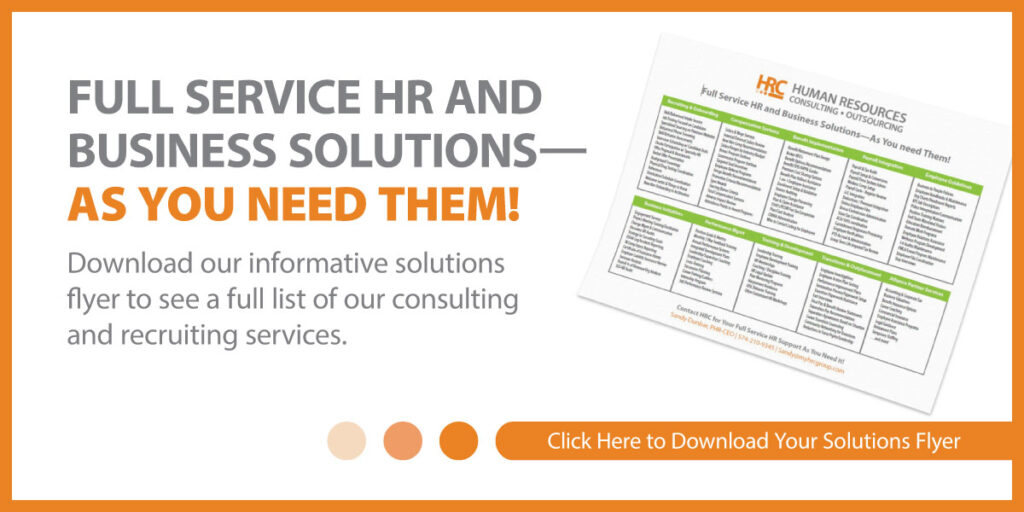It’s a new year which means it’s time for the annual performance review or check-in process. Performance measuring and compensation reviews are essential to human resources in documenting how well an employee is performing and that their pay matches that performance level in the market. These can be viewed as an opportunity to provide feedback to improve their work and establish output goals, development plans, and priority actions for the new year. Managers and employees alike often dread the annual review – but you shouldn’t. In this blog, we’re going to provide tips for making the performance review process much more productive and valuable for your business.
Want to Learn the Latest People and Business Trends? Click Here to Learn More!
Share Expectations with Team in Advance
When it comes to the performance review meeting, it shouldn’t come as a surprise to your employees. A productive meeting will be a two-way conversation between the manager and the employee. In order for it to be productive, it is recommended to share the agenda, background information, and possible topics with the employee ahead of time. Transparency through sharing this information ahead of time, allows the employee the opportunity to be prepared to discuss topics with you such as career advancement. Expectations from both parties supports the notion that the meeting is a two-way conversation.
Conduct Performance Reviews Regularly
Most managers conduct reviews about once a year, but it shouldn’t stop there. Ideally, good managers should be having regular conversations with their employees throughout the year (at least one time per month). Having regularly scheduled meetings with your employees will strengthen your relationship and shows value and appreciation for what they do. Conducting regular performance review meetings also allows managers and employees to keep on top of any priority actions, key metrics, potential obstacles, and other topics before they become a problem. This also ensures your department business goals will be met if everyone is aligned monthly towards their goals.
Give Praise and Balanced Feedback
A performance review is most effective when the discussion provides balanced feedback. Managers should give praise and credit when due but also be prepared to tackle any issues or concerns head-on. Managers should also have examples to back up any of their points. This could include stating the number of times the problem occurred or documentation if the job involves paperwork.
Another tip we recommend is framing the conversation to be positive. For example, managers should start the conversation around the goal (I want to ensure you succeed in this area, as an example). Then address the realities of what is happening and what the expectations are around the matter. It is also important to avoid using terms like “weaknesses” or “failures” and try to be more constructive by using terms like “solutions” or “areas to improve”. By using more constructive and positive language, your feedback will be more motivating to the employee. Ask for questions and their commitment to move forward and end the meeting with an encouraging note (I know you can do this! Looking forward to seeing next month’s results).

Solicit Feedback from Employees
As a manager, you are busy and not always available to work alongside your employees. While you are still the most qualified to review their performance, it is also helpful to get feedback from those who interact with your employees on a daily basis including customers, clients, co-workers, and other managers. You can collect feedback from others through surveys or “quality check” meetings. If you choose to get feedback from others, be sure that the information is confidential and only objective, factual information is used in conjunction with your holistic performance approach.
Another way to gather feedback on your employee’s performance is by asking the employee for a self-assessment. This is a good way to prepare the employee for the review as well as gather any information or concerns that they may have ahead of the meeting.
Keep Documentation Throughout the Year
Similar to the importance of regular review meetings, keeping documentation throughout the year of the employee’s performance is beneficial to a fair and productive process. If an employee has a track record of successful projects or missed deadlines then it is important to take these into consideration so that you can conduct a fair assessment at year-end that will correlate to any compensation or rewards programs.
As you begin conducting your performance management process, we hope that these tips will be helpful. The process should not be viewed as another task on your to-do list but should be viewed as an opportunity to develop relationships, improve performance, and enhance your business’s productivity.

